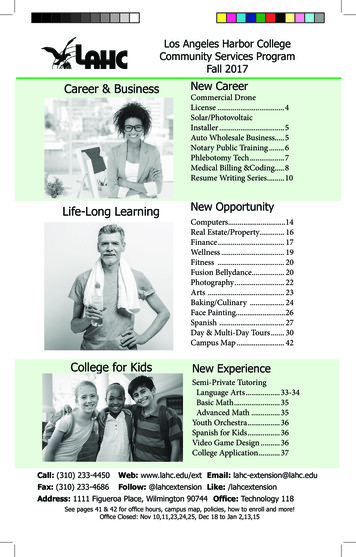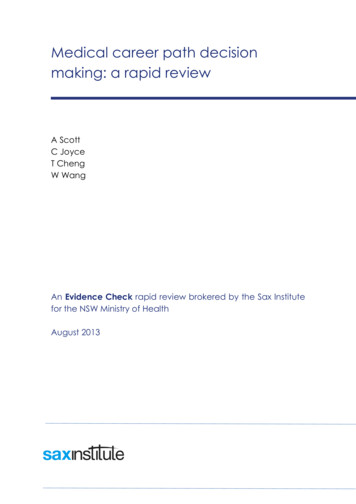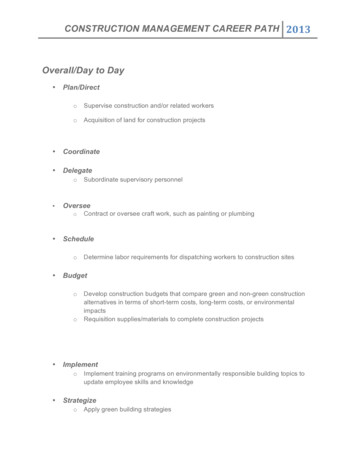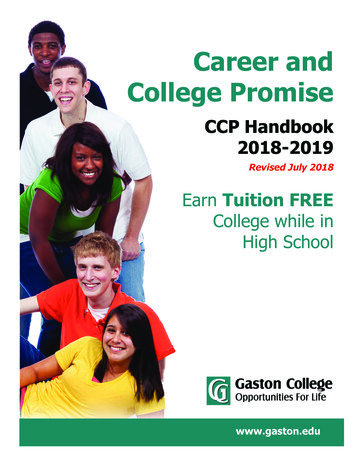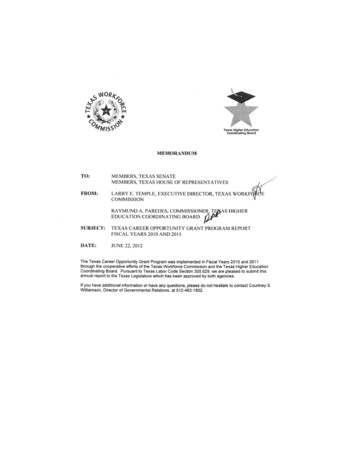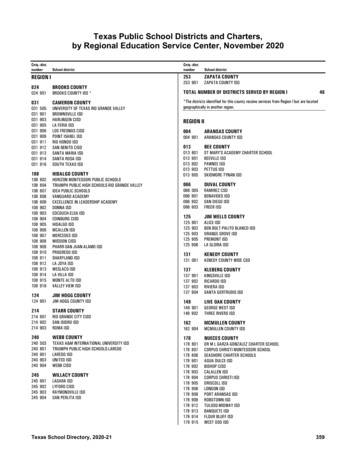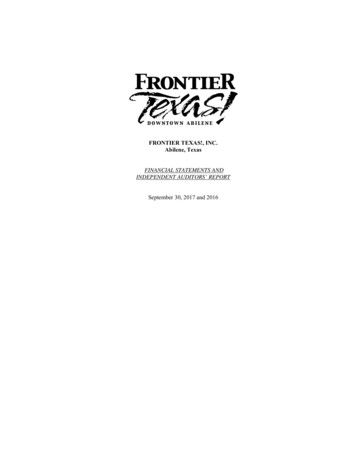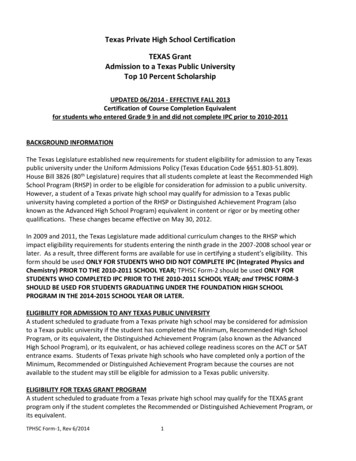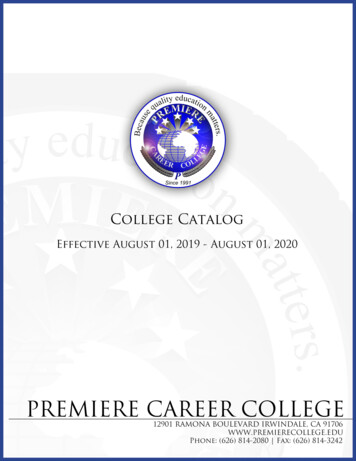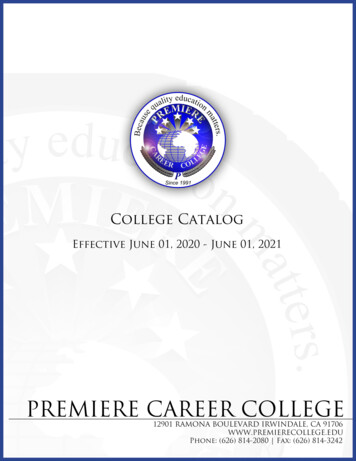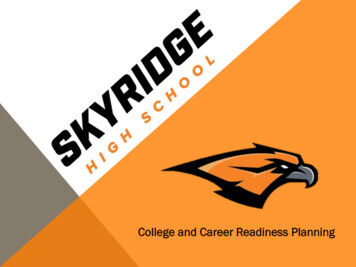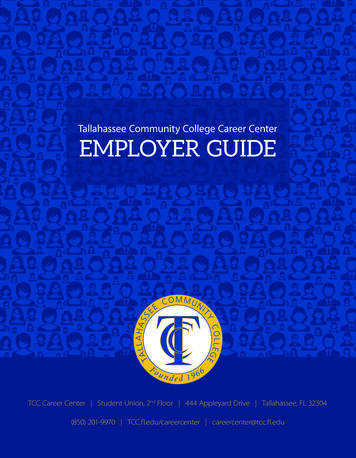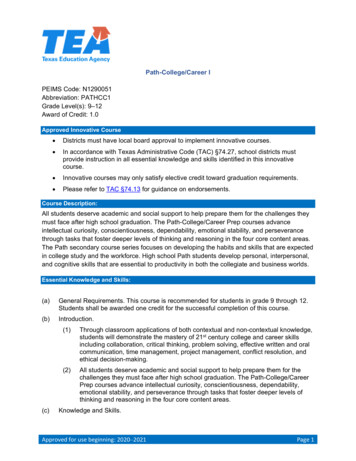
Transcription
Path-College/Career IPEIMS Code: N1290051Abbreviation: PATHCC1Grade Level(s): 9–12Award of Credit: 1.0Approved Innovative Course Districts must have local board approval to implement innovative courses. In accordance with Texas Administrative Code (TAC) §74.27, school districts mustprovide instruction in all essential knowledge and skills identified in this innovativecourse. Innovative courses may only satisfy elective credit toward graduation requirements. Please refer to TAC §74.13 for guidance on endorsements.Course Description:All students deserve academic and social support to help prepare them for the challenges theymust face after high school graduation. The Path-College/Career Prep courses advanceintellectual curiosity, conscientiousness, dependability, emotional stability, and perseverancethrough tasks that foster deeper levels of thinking and reasoning in the four core content areas.The Path secondary course series focuses on developing the habits and skills that are expectedin college study and the workforce. High school Path students develop personal, interpersonal,and cognitive skills that are essential to productivity in both the collegiate and business worlds.Essential Knowledge and Skills:(a)General Requirements. This course is recommended for students in grade 9 through 12.Students shall be awarded one credit for the successful completion of this course.(b)Introduction.(c)(1)Through classroom applications of both contextual and non-contextual knowledge,students will demonstrate the mastery of 21st century college and career skillsincluding collaboration, critical thinking, problem solving, effective written and oralcommunication, time management, project management, conflict resolution, andethical decision-making.(2)All students deserve academic and social support to help prepare them for thechallenges they must face after high school graduation. The Path-College/CareerPrep courses advance intellectual curiosity, conscientiousness, dependability,emotional stability, and perseverance through tasks that foster deeper levels ofthinking and reasoning in the four core content areas.Knowledge and Skills.Approved for use beginning: 2015-2016Approved for use beginning: 2020–2021Page 1
Path-College/Career I(1)(2)(3)(4)(5)Critical Thinking and Reasoning Skills. The student describes the mentalprocesses of learning through the analysis and practice of skills and strategies.The student is expected to:(A)describe the process of learning;(B)identify preferred approaches and strategies to learning;(C)engage in scholarly inquiry and dialogue;(D)apply specific memory strategies such as breaking down tasks, repetition,and mnemonic devices to particular tasks;(E)transfer appropriate memory processes to new situations; and(F)practice reflection and the monitoring of new learning.College and Career Planning. The student examines college and career choicesavailable and designs a personal action plan for a selected choice. The student isexpected to:(A)research interests, colleges, and careers and assemble relevantinformation;(B)develop a career plan that includes needed training, education, and skills;(C)research personal interest pertaining to community service options andcomplete activities for the interest-based community service project; and(D)create an academic portfolio to record work.Ethical Codes of Conduct. The student demonstrates ethical behavior andpersonal character. The student is expected to:(A)identify and follow ethical codes of conduct found at the college/careerlevel such as integrity, responsibility, discipline, respect, and teamcollaboration;(B)examine assumptions and beliefs about ethics;(C)define ethics and its relationship to attitudes and values; and(D)examine the relationship between integrity and character.Personal and Interpersonal Skills. The student identifies life skills necessary forpositive interactions and communication. The student is expected to:(A)identify strengths, talents, and abilities through self-awareness activities;(B)follow directions or procedures independently;(C)identify negative attitudes, both personal and those of others, to helpcreate positive outlooks; and(D)identify and use active listening strategies such as eye contact and vocalcueing.Academic Behaviors. The student associates personal responsibility withacademic success by strengthening positive learning behaviors and alteringineffective habits. The student is expected to:(A)identify and manage time wasters such as social media, technology,perfectionism, or procrastination;(B)identify time management strategies;Approved for use beginning: 2015-2016Approved for use beginning: 2020–2021Page 2
Path-College/Career I(6)(C)identify personal learning style to improve study habits;(D)describe the differences between methods of notetaking including twocolumn, Cornell, flashcard, SQ3R (sentence, survey, question, read,recite, and review), and REDW (read, examine, decide, and write);(E)distinguish between main points, elaboration, example, and repetition indifferent types of presentations such as lecture, video, or audio;(F)explain the purpose of goal setting and prioritization; and(G)develop critical reading and writing skills across the curriculum.Research Skills. The student applies an organized framework to identify an area ofinterest, collect information, record findings, and create a presentation both orallyand in writing. The student is expected to:(A)distinguish between guided research and independent research;(B)identify and research an area of interest and passion;(C)use educational technology to conduct research;(D)determine, locate, and explore a variety of resources;(E)generate ideas and gather information relevant to the topic and purpose;(F)organize the information gathered; and(G)identify and employ effective communication and presentation skills.Recommended Resources and Materials:Textbooks:Carter, C., Bishop, J., & Kravits, S. L. (2011). Keys to effective learning: developing habits forsuccess. Boston: Pearson Allyn & Bacon.Covey, S. (2019). The 7 habits of highly effective teens: the ultimate teenage success guide.New York, NY: Simon & Schuster Paperbacks.Sherfield, R. M., & Moody, P. G. (2011). Cornerstone: creating success through positivechange. Boston, MA: Pearson/Allyn & Bacon.Suggested Resources:Bill & Melinda Gates Foundation, Afton Partners, The Eli & Edythe Broad Foundation, et.al.(n.d.). A Working Definition of Personalized Learning. Retrieved -1.pdf.Covey, S. (2013). The 7 habits of highly effective teens: with companion workbook. New York:Simon & Schuster.CollegeBoard. (n.d.). BigFuture. Retrieved from https://bigfuture.collegeboard.org/.College Board: Pre-AP and AP Strategies and Support. Pearson. (n.d.). MyLab FoundationalSkills. Retrieved america/myfoundationslab/.Approved for use beginning: 2015-2016Approved for use beginning: 2020–2021Page 3
Path-College/Career IRecommended Course Activities:ALL LEVELS: Active participation in tutorial sessions Enrollment in advanced level course(s) Career Guidance, Exploration, and Planning System (e.g. Career Cruising, Kuder,ASVAAB, Big Future) College Campus Visits (in-person, digital, or presentation by a college representative)Recommended Path I & II: High school degree plan College/Career records file Post-secondary “Course-of-Study” Plan Path group community service project PSAT and/or ACT AspireFor College-going students: Complete Apply Texas FAFSA resume/send letters of recommendation transcript retrieval College VisitsFor Career-path students: Complete certification Job application process resume/letters of recommendation work and experiential background documentation Workplace VisitsSuggested methods for evaluating student outcomes: Extra-curricular activity participationCommunity service participation reflection cardsPersonal/Interpersonal Skills SurveyReflection journalCollege/career researchSpeeches / presentationsSamples of note-taking methodsGoal setting / prioritization logsTeacher qualifications:An assignment for Path College/Career I-IV is allowed with a valid certificate appropriate to thegrade level of assignment.Recommended: College Board Institute Training GT 30-hour foundational trainingApproved for use beginning: 2015-2016Approved for use beginning: 2020–2021Page 4
Path-College/Career IAdditional information:Interested districts can contact Kathleen Plott at kplott@kleinisd.net for example of districtdesigned training.Approved for use beginning: 2015-2016Approved for use beginning: 2020–2021Page 5
students will demonstrate the mastery of 21st century college and career skills including collaboration, critical thinking, problem solving, effective written and oral communication, time
